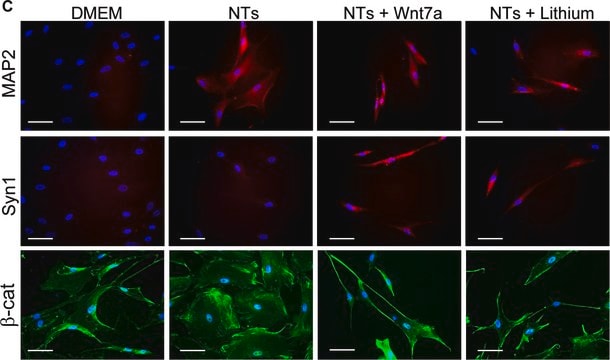S2822
Anti-Synapsin II in Kaninchen hergestellte Antikörper

~1 mg/mL, affinity isolated antibody, buffered aqueous solution
Synonym(e):
Anti-SYN2, Anti-SYNAPSIN 2, Anti-SYNII, Anti-SYNIIa, Anti-SYNIIb
About This Item
Empfohlene Produkte
Biologische Quelle
rabbit
Qualitätsniveau
Konjugat
unconjugated
Antikörperform
affinity isolated antibody
Antikörper-Produkttyp
primary antibodies
Klon
polyclonal
Form
buffered aqueous solution
Mol-Gew.
antigen ~54 kDa (synapsin IIb)
antigen ~74 kDa (synapsin IIa)
Speziesreaktivität
mouse, human, rat
Erweiterte Validierung
recombinant expression
Learn more about Antibody Enhanced Validation
Konzentration
~1 mg/mL
Methode(n)
western blot: 0.5-1 μg/mL using extracts of HEK-293T cells expressing recombinant human synapsin II, mouse brain extract (S1 fraction), and rat PC12 cell lysate
UniProt-Hinterlegungsnummer
Versandbedingung
dry ice
Lagertemp.
−20°C
Posttranslationale Modifikation Target
unmodified
Angaben zum Gen
human ... SYN2(6854)
mouse ... Syn2(20965)
rat ... Syn2(29179)
Allgemeine Beschreibung
Spezifität
Immunogen
Anwendung
Biochem./physiol. Wirkung
Physikalische Form
Lagerung und Haltbarkeit
Haftungsausschluss
Not finding the right product?
Try our Produkt-Auswahlhilfe.
Ähnliches Produkt
Lagerklassenschlüssel
10 - Combustible liquids
WGK
WGK 3
Flammpunkt (°F)
Not applicable
Flammpunkt (°C)
Not applicable
Persönliche Schutzausrüstung
Eyeshields, Gloves, multi-purpose combination respirator cartridge (US)
Analysenzertifikate (COA)
Suchen Sie nach Analysenzertifikate (COA), indem Sie die Lot-/Chargennummer des Produkts eingeben. Lot- und Chargennummern sind auf dem Produktetikett hinter den Wörtern ‘Lot’ oder ‘Batch’ (Lot oder Charge) zu finden.
Besitzen Sie dieses Produkt bereits?
In der Dokumentenbibliothek finden Sie die Dokumentation zu den Produkten, die Sie kürzlich erworben haben.
Unser Team von Wissenschaftlern verfügt über Erfahrung in allen Forschungsbereichen einschließlich Life Science, Materialwissenschaften, chemischer Synthese, Chromatographie, Analytik und vielen mehr..
Setzen Sie sich mit dem technischen Dienst in Verbindung.








